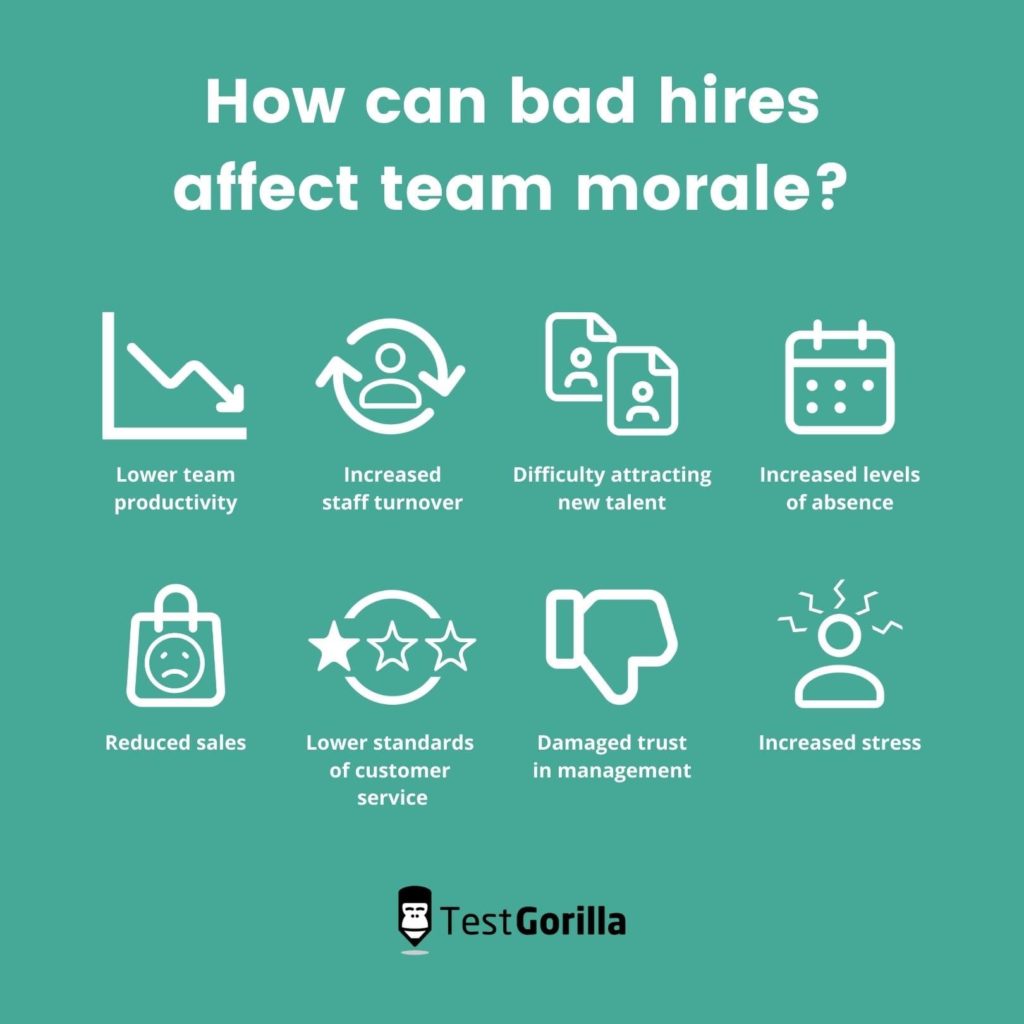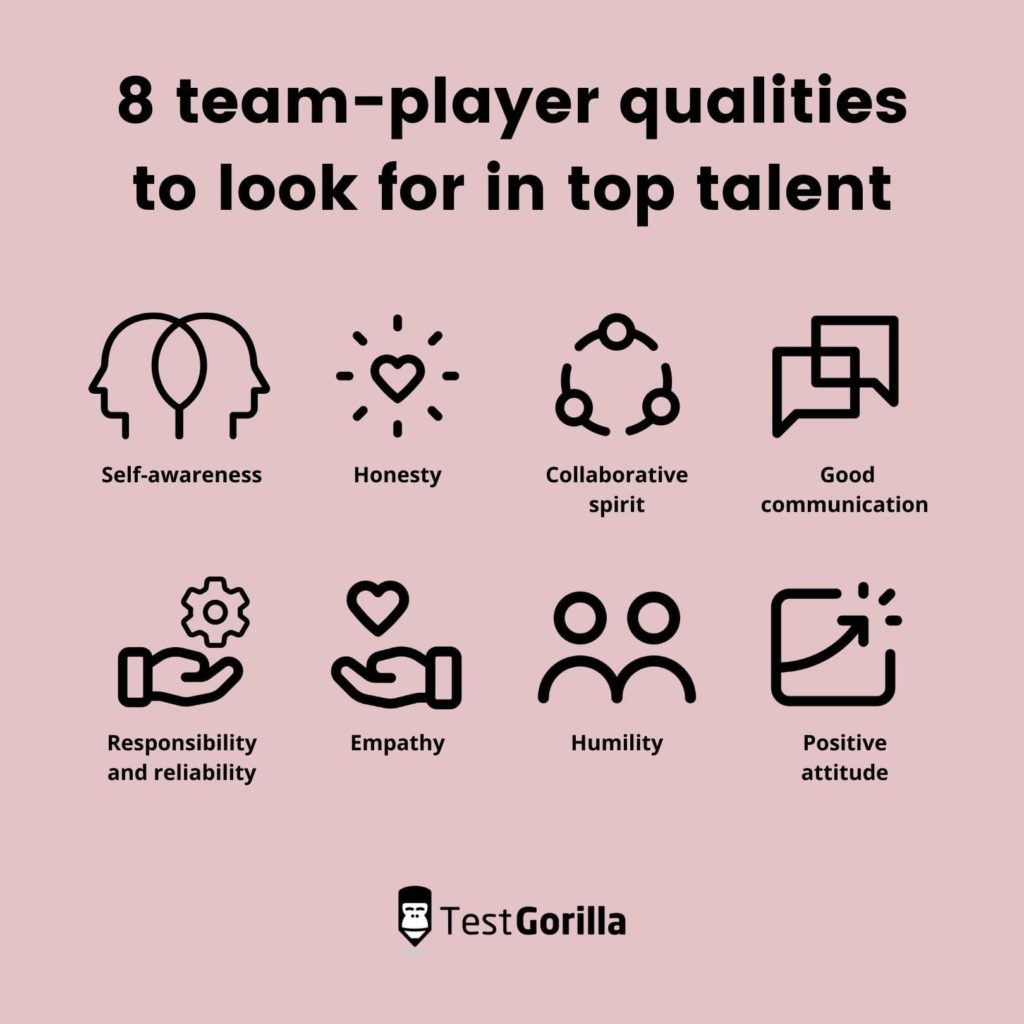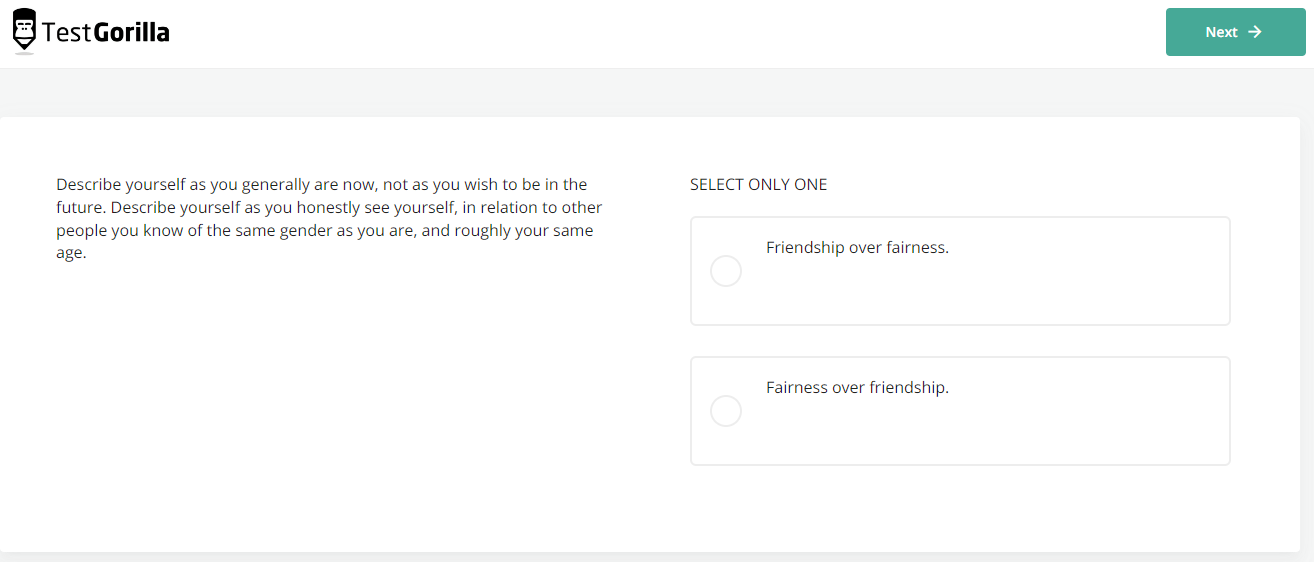There’s talent, skill, and experience – and then there’s personality.
When you want to find the perfect hire, it’s tempting to focus on the experience and the hard skills required for the job.
But you can’t forget that these come attached to the individual selected for the role.
What happens when an employee puts problems under the rug instead of trying to solve them?
What if they start showing passive-aggressive behavior or intolerance to their team members?
Pretty much every organization relies on effective teams to function and thrive, and employees need to have the right set of soft skills to succeed in a collaborative environment.
The thing is, soft skills can be hard to screen.
But looking for team player qualities in candidates is vital for a healthy workplace, so let’s talk about how you can spot them and what exactly this shift can do for your business.
Table of contents
- Why do team players matter in an organization?
- 1. Self-awareness
- 2. Honesty
- 3. Collaborative spirit
- 4. Good communication
- 5. Responsibility and reliability
- 6. Empathy
- 7. Humility
- 8. Positive attitude
- Recapping the top team-player qualities
- How TestGorilla can help you recognize team-player qualities
- Add team-player qualities to your list of job requirements
Why do team players matter in an organization?
You can teach people time-management skills, or help them grow into a new role.
But you can’t teach them the innate characteristics they need to be great team members.
You need to know your employees will be able to solve problems and contribute to a a positive workplace.
Some basics in communication and collaboration are necessary.
For instance, if someone with an issue never communicates, lashes out, or tries to undermine a colleague, they can impair the health of your workplace, impacting on everyone involved.
“Be a sensible person” should go without saying, right?
So you may want to focus on the skill sets of your hires instead and hope they also happen to possess team-player qualities.
But overlooking the importance of innate personal traits can be a costly mistake.
A single bad hire could cost you $15,000 on average.
The reality is that teams have to work together on a daily basis, so how they manage collaboration can make or break a workplace and directly impact their work performance/satisfaction.
Unsurprisingly, researchers rate a negative attitude and inability to work with others as among the top indicators of a bad hire.
We’re not saying a person needs to be exactly like their future colleagues – fostering a diverse team is healthy for an organization.
But there are some essential qualities that any prospective team player needs to show.
We haven’t listed them in order of importance, but ideally, you’d want to tick most of these boxes, not just a few.
Let’s take a deep dive into what makes a good team player.
So if you’re busy and just need the TL;DR option, feel free to skip forward to the final summary where we’ll reiterate the essentials.
1. Self-awareness
“Self-awareness” means being a grounded, realistic person who knows themself and their place and accounts for the impact they make on others.
A self-aware person holds themself accountable for their actions and shows they understand they’re neither perfect nor the most important person in the room.
What does that look like in your day-to-day business?
For example, a self-aware employee will acknowledge when they’ve made a mistake and not take it personally when someone calls them out.
They won’t insist you prioritize them or be unreasonable.
They understand themselves and their flaws.
This quality helps them see others as equally imperfect and important.
Where and when does self-awareness matter?
Self-aware people can take constructive criticism.
They aren’t trying to prove they’re never at fault – everybody makes mistakes. Feedback only helps them improve.
Why is this a good team player quality?
Because you can reason with these people. As long as you’re being respectful to them, they will be open to hearing what they should work on next and why it’s important.
You can discuss ideas with them and they can integrate anywhere.
They won’t come with an inflated sense of self, and you’ll be able to address any bad habits they might bring without first going through multiple stages of denial.
Self-awareness is a plus in any situation in the office.
2. Honesty
Honesty doesn’t simply mean not lying. By “honest,” we mean that someone speaks the truth proactively and doesn’t wait to be confronted.
They don’t shove problems under the rug. They don’t say one thing and do the other. Their actions align with their words and you can trust what they say.
If they forget to do something or accidentally cause harm, they own up to it – they don’t try to get away with things or blame them on others.
Where and when does honesty matter?
A lack of honesty can quickly make a workplace toxic. One person like that in a team is enough to make everyone feel unsafe and ruin the morale.
The thing is, you can’t be sure what’s going on if an employee is dishonest – and by the time you figure out there’s a problem, the damage could be serious.
For example, your employees could lose their confidence in management’s ability to protect them, and their performance could suffer as a result.
All because of a single bad apple that went under the radar.
It’s easier for all parties involved if you prioritize ethics and honesty during the hiring process because, with honest employees, you know who you’re dealing with.
They tell you how they’re doing, what they need from you, and what they’re going through, so it feels like it’s you and them vs. the problem rather than you vs. them.
3. Collaborative spirit
Collaborative people think of what’s best for the team.
They don’t put themselves above others.
They’re able to work with different kinds of people towards a shared goal, even if sometimes they have to make compromises. They’re good contributors to all team tasks.
Try to remember any school group project you were part of.
You always had at least one classmate who would never even show up, and all the work would fall on the others.
Those types of projects always ended in one of two ways:
Failure
Success, but at the cost of one person overworking and probably becoming resentful of the work and their teammates
Adults function in the same way.
Except that your projects are more important, and you can’t afford people who don’t pull their weight.
Where and when does collaborative spirit matter?
Collaboration is important to any group setting. A collaborative person is an effective team player.
If a person isn’t collaborative, they will have issues working effectively with a team.
They might not communicate as well, bump heads often, or refuse to cooperate if it doesn’t go their way.
Collaboration is an essential team-player quality because it directly affects the results of team projects.
People work together well can get things done better and faster, fostering strong long-term relationships while they’re at it.
If not, it could be detrimental to your work efforts.
4. Good communication
Effective communication is a cornerstone of any collaboration, impacting the work environment and outcomes every day. Communication skills can make or break collaborations.
So what does a good communicator look like in a workplace setting?
They speak their mind directly and openly – no mind games or passive aggression
They practice active listening, so they understand their colleagues better
They check in often and give you a heads-up about anything you may want to know
They’re easy to reach and don’t become unavailable without warning
They don’t wait for you to ask if something is wrong
They treat colleagues with respect and honesty
They report proactively and you don’t have to coax anything out of them
In sum, they make it easy for you to know what’s going on.
Where and when does good communication matter?
How about some statistics?
86% of professionals feel that poor collaboration and communication are the main causes of workplace failures
Good communication increases team productivity by 25%
Effective communication increases retention 4.5 times
So it’s safe to say that communication matters anywhere.
But fostering good communication is especially important for remote teams.
If you’re running a remote team, you have less insight into what your employees are doing by default because they’re not right in front of you.
If they don’t have a habit of checking in, don’t report challenges promptly, or become unreachable, that becomes a complication for you.
You can’t organize well or react to problems.
If you never experienced these issues with your remote employees, lucky you! That means you’re already working with some good communicators.
But if this sounds all too familiar and you want your new candidates to communicate better, you can use communication assessment tools to help you make the best hire.
5. Responsibility and reliability
Reliable people show up consistently and always finish their work.
These are the people you can give a job to and know for certain that you won’t have to clean up after them – they won’t forget important details or leave you hanging.
For managers who work on multiple projects at once, having responsible and reliable people makes a big difference.
So what are some signs of a responsible person?
They communicate their availability upfront
They don’t promise what they can’t deliver
They ask relevant questions proactively to make sure they’re on the right track
Whenever they take something on, they see it through until the end
If they have a problem, they tell you ahead of time, not at the last minute
They do the job thoroughly and often go above and beyond expectations, taking on more than their fair share of work
They’re interested to learn more about how their job serves the process/project so they can do even better
They implement feedback immediately
If you have someone like that on your team, we probably don’t need to tell you to cherish them and support their initiative.
Where and when do responsibility and reliability matter?
Having people you can count on to do their part makes management easier.
There’s a lot to be said about proper workplace organization and task allocation.
But if you have people on your team who you aren’t sure will carry their weight, the most meticulous plan goes out the window.
Reliable employees can guarantee that they will not fall short, so you won’t feel like you have to micromanage or step in all the time. Responsible and reliable employees make a strong team. And at the end of the day, that’s what you want.
6. Empathy
Empathy is the ability to put yourself in another person’s shoes and understand their feelings, ideas, experiences, and struggles – and show compassion.
Empathetic people show high emotional intelligence. They feel for others and take action to help when possible.
Any team can benefit from empathetic employees, and most candidates search for workplaces whose culture promotes it.
Where and when does empathy matter?
This is a good trait for all types of workers, but it’s also crucial for assessing team leaders.
Empathetic leaders can directly improve the health of a workplace:
They notice when team members start to struggle before they burn out
They show an interest in employees’ wellbeing, interests, hopes, etc. – and they are experts at active listening
They make people feel safe and comfortable enough to be honest
They are willing to support those who need it and show compassion during hard times
Managers who show empathy tend to perform better at their jobs.
By now, we’ve all seen our colleagues in sweatpants with pets and children running in the background of a Zoom conference call.
Personal and professional are no longer separated into clear-cut categories.
So having a leader who sees people for the human beings they are and demonstrates empathy makes workers feel appreciated.
To translate that into business benefits, empathetic managers will help people be happier at their jobs, do it better, and likely stay at your organization longer.
7. Humility
Humility is often mistaken for weakness and overlooked as a desirable team-player quality at work.
But in reality, any employee, especially a team leader, should have it.
Humble people aren’t in it for appearances.
When they receive praise, for example, they remember to credit others – most of the time, a work win is a team effort, and everyone who participated deserves recognition for their work.
You’ll often hear them say “thanks” and “well done” to others.
“Glad the tip worked – I learned it from Maria!”
They don’t pretend to know everything, because it’s not all about them.
It’s about teamwork, and a humble worker is one of the best team members you can find.
Where and when does humility matter?
Eighty-five percent of people experience conflict in the workplace, and 49% of that is due to personality clashes and egos.
You may see people pulling in different directions, or going “me, me, me” any chance they get.
Humble leaders don’t do that.
They don’t hold themselves in higher esteem than others, and their efforts to uplift people are often recognized and mirrored by their team.
Their willingness to admit they aren’t experts in every matter also makes them open to new ideas.
This creates opportunities for improvement. Humble leaders boost team performance as a result.
8. Positive attitude
Positive people focus on the good things in life. They find a way to improve any situation, look for silver linings, and generally avoid letting things bring them down for too long.
This isn’t a “happy-go-lucky” personality.
And it’s also not toxic positivity, ignoring problems, or a lack of awareness.
Positive people are optimists. They see challenges where others see insurmountable problems.
They don’t dwell on what they can’t change. Instead, they focus on what’s in their control and put in the work to make it better.
A healthily positive attitude is an important asset for any business effort.
You won’t solve any problem if you don’t believe there’s a chance it can be solved to begin with.
Where and when does a positive attitude matter?
A positive employee is likely to encourage others to keep trying, or celebrate wins before identifying what needs improvement.
This feels nice, but it also benefits your organization.
A positive work culture boosts health and improves productivity because:
It keeps the team morale high
It helps people stay on track through difficult times
It emphasizes people’s efforts and good ideas
It fuels problem-solving and creativity
It makes a strong team, overall
It makes the workplace a sunnier place to be, and that’s always a welcome bonus.
Recapping the top team-player qualities
That’s a lot of information to keep track of.
If you need a quick overview of what you just read or an overview because you skimmed up until this point, here’s a short recap of the top team player qualities:
Top team player quality | Why it matters |
1. Self-awareness | Self-aware people understand themselves and their flaws and are able to accept and implement feedback. They understand that others are equally imperfect and important in a team, so they don’t expect special treatment. |
2. Honesty | Honest people are trustworthy and easy to work with. They help establish an environment in which you work on problems as they arise and solve conflicts fairly. |
3. Collaborative spirit | Collaborative people value teamwork and don’t put themselves above others. They’re quick to help, invested in group efforts, and can work well even with people who are different from them. |
4. Good communication | Effective communication improves productivity and increases the chances of employee retention.Communication skills help with management of in-house and remote teams alike. |
5. Responsibility and reliability | Reliable workers make management easy.You can count on them to show up, be proactive, and go the extra mile. |
6. Empathy | Empathy, especially in leaders, creates a healthy atmosphere at work where people are comfortable sharing their struggles. This means they can get help when they need it, avoid burnout, and be happier at work. |
7. Humility | Humble leaders boost team performance because they’re open to new ideas. They don’t let their egos get in the way of progress or teamwork. |
8. Positive attitude | Positivity boosts health and productivity. Positive people improve team morale and don’t let setbacks keep them down for long. |
And now that you know what to look for in an ideal team player, we can talk about how you might assess team-player qualities in your candidates.
Spoiler: It’s with help, of course.
How TestGorilla can help you recognize team-player qualities
All of the team-player examples we just talked about make sense and sound nice in theory, but how do you test for them when hiring?
TestGorilla has the tools for you.
Use these tools to focus on great team-player qualities from day one and recruit better without any biases.
1. Personality testing
Tests like the Big 5 Personality test, the 16 Types test, and the Enneagram test are effective for scoping out characteristics that indicate team-player qualities at work.
It’s hard to evaluate a stranger and decide what kind of person they are – even if you have excellent interview questions.
And that’s where these tests come in handy.
They offer a variety of personal questions to determine how a person would respond in realistic scenarios and build a profile based on their answers.
Now, two important notes before we continue:
Just because somebody’s personality aligns with the team doesn’t mean they have team player qualities
Ideally, you’re looking for a culture add (to complement your team) over a culture fit (someone who’s similar to the rest of the team)
If you’re confused about the difference between a culture add and a culture fit, it comes down to this:
You can benefit more from expanding your current team with different perspectives and fresh ideas instead of getting more of the same – the workplace shouldn’t primarily be an echo chamber/comfort zone.
Okay, now back to personality testing.
How does it beat an interview?
First off, they’re not mutually exclusive.
But there are a few things personality tests do that interviews can’t:
Personality test benefit | What it does/how it compares to an interview |
1. Individual answers are confidential | Unlike in an interview, only the final results are shareable on a test, so there’s a higher chance people will be comfortable being honest. |
2. Way less pressure to give a quick answer | In an interview, candidates may be put on the spot and blurt out whatever seems like the answer you want to hear, but during a personality test a candidate can take their time and be themselves without fear of judgment. |
3. There’s no single “right” answer | Personality tests don’t have good or bad results. They just show what a person is innately like and what their default responses/needs/strengths might look like. |
4. Provide more holistic insight | Tests help you avoid hiring based on great interview skills. You acknowledge that different types of people shine in different environments and are willing to learn what those are for your candidates. |
5. Promote and celebrate diversity | You’re not just mining for talent, you’re learning how to support and accommodate your hire so they thrive in their new role. |
By nature, interviews simply can’t account for some things.
For instance, you may hire a candidate who seems like they have team-player qualities, but it then turns out they were only respectful to you because you’re in a position of authority and they disrespect their colleagues.
Or you may feel like a person doesn’t have a positive attitude and pass on them, but they were simply anxious during the interview.
We’re not saying that interviews aren’t valuable. But for a complete overview of the situation and better hiring decisions, combine them with personality tests.
2. Custom questions/processes
Custom processes let you go a step further when filtering your search for ideal candidates.
You can use the option for video responses to ask your candidates situational-based questions where they need to demonstrate how they would go about solving complex issues within a team.
This could help you gauge their personality on a different level:
It will show you a more honest version of your candidate because they won’t subconsciously mirror the interviewer or blurt things out
You’ll see their thought process unfold in real time so you’ll know what to expect from them going forward
You can give candidates the opportunity to choose how they submit their responses so they can pick the option that best suits them.
Their choice immediately tells you something about them.
Another perk of this approach is that you can be confident that what you’re seeing realistically represents the candidate in the best light.
All of this helps to show you the human behind the resume.
You can’t rely on clunky outdated hiring processes to give you any other results than what they always did: experience levels, work history, and skillset overviews.
These indicators aren’t good enough to ensure a great hire.
To improve your recruitment decisions, you need to use specialized tools and screen for team-player qualities before you add people to your teams.
Add team-player qualities to your list of job requirements
Screening for great team-player qualities should be at the front of your mind.
A person’s character, values, habits, and communication style aren’t things you can work on, but they can drastically impact your organization.
Often, they make more difference than their hard skill set or previous experience.
So how do you account for this? To sum up, you can:
Add a few of the most relevant traits to your job descriptions when describing an ideal candidate
Include situational questions to see how a person might respond to real-life workplace situations
Consider personality tests as an efficient way to objectively evaluate candidates before the interview stage
Now, where could you find tests…?
You can leave that part to us. Try our hiring tools for free.
Related posts
Hire the best candidates with TestGorilla
Create pre-employment assessments in minutes to screen candidates, save time, and hire the best talent.
Latest posts
The best advice in pre-employment testing, in your inbox.
No spam. Unsubscribe at any time.

Hire the best. No bias. No stress.
Our screening tests identify the best candidates and make your hiring decisions faster, easier, and bias-free.
Free resources
This checklist covers key features you should look for when choosing a skills testing platform
This resource will help you develop an onboarding checklist for new hires.
How to assess your candidates' attention to detail.
Learn how to get human resources certified through HRCI or SHRM.
Learn how you can improve the level of talent at your company.
Learn how CapitalT reduced hiring bias with online skills assessments.
Learn how to make the resume process more efficient and more effective.
Improve your hiring strategy with these 7 critical recruitment metrics.
Learn how Sukhi decreased time spent reviewing resumes by 83%!
Hire more efficiently with these hacks that 99% of recruiters aren't using.
Make a business case for diversity and inclusion initiatives with this data.























